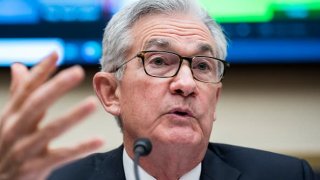
Federal Reserve Chairman Jerome Powell testifies during the House Financial Services Committee hearing titled Oversight of the Treasury Department’s and Federal Reserve’s Pandemic Response, in Rayburn Building on Wednesday, December 1, 2021.
- "The question we've got to ask ourselves is 'should we fight the Fed?' And I'm saying actually we should consider that because the Fed are fallible," Isaac Stephens from Alvine Investment told CNBC.
- The comments come as the U.S. experiences rapid inflation and a booming dollar, and economists speculate over what the Fed will do next.
Investors shouldn't necessarily align their investment decisions with the Federal Reserve's actions, according to Stephen Isaacs, chairman of the investment committee at Alvine Capital.
"The question we've got to ask ourselves is 'should we fight the Fed?' And I'm saying actually we should consider that, because the Fed are fallible. The Fed basically got it wrong for two years," Stephens told CNBC's "Squawk Box Europe" on Thursday.
His comments come as the U.S. experiences rapid inflation and a booming dollar, and economists speculate over what the Fed will do next.
Get Connecticut local news, weather forecasts and entertainment stories to your inbox. Sign up for NBC Connecticut newsletters.
Investors around the world will be watching September's jobs report, due later Friday, for further clues as to the Fed's next moves.
Stephens said that the Fed took until this summer to real deal with the U.S.' economic situation, after "stoking inflationary fires" toward the end of the Covid-19 pandemic.
Money Report
The Fed's benchmark rate was near-zero in March, but it has since embarked on its most aggressive series of rate hikes since the 1980s, raising the rate to a target of at least 3%.
Now, Stephens said it may be worth banking a U-turn from the Fed.
"If the data really changes, if the economic and credit situation crucially in the economy starts to really unravel then the Fed … will aggressively pivot. And bearing in mind the market is so far ahead in the assumptions of much high interest rates, that could have a very dramatic effect on asset prices," Stephens said.
The U.S. isn't out of the woods yet economically, Stephens said, with a number of "very difficult situations" coming in the months ahead.
"I believe there could be a credit event [in that time]. There could be something that blows up … So that's the kind of thing I'm really looking for, I'm looking for a trigger point, and I think investors should be looking in that period to accumulate assets," Stephens said.
There has been much talk of a so-called Fed pivot over recent months, with Anastasia Amoroso, chief investment strategist at iCapital, saying Tuesday that investors should not expect the Fed to U-turn imminently.
— CNBC's Hugh Son contributed to this report.